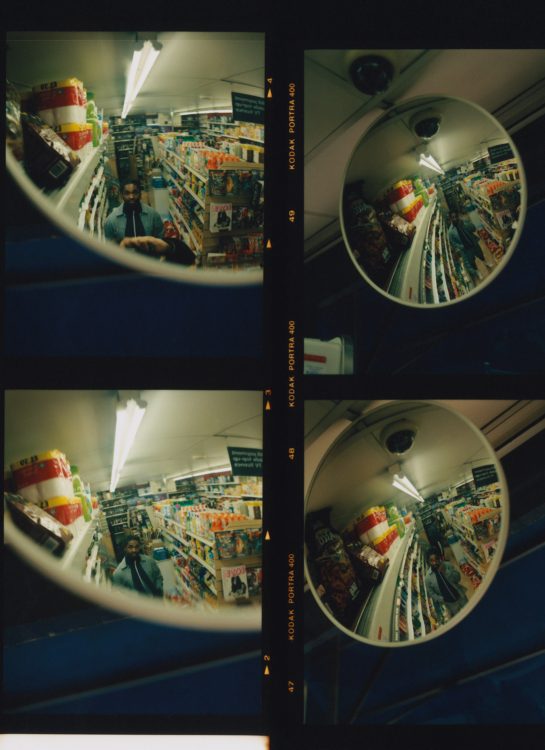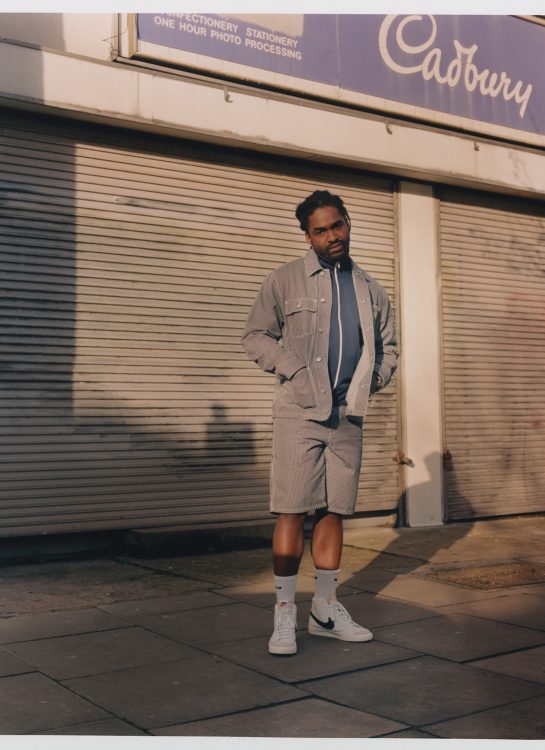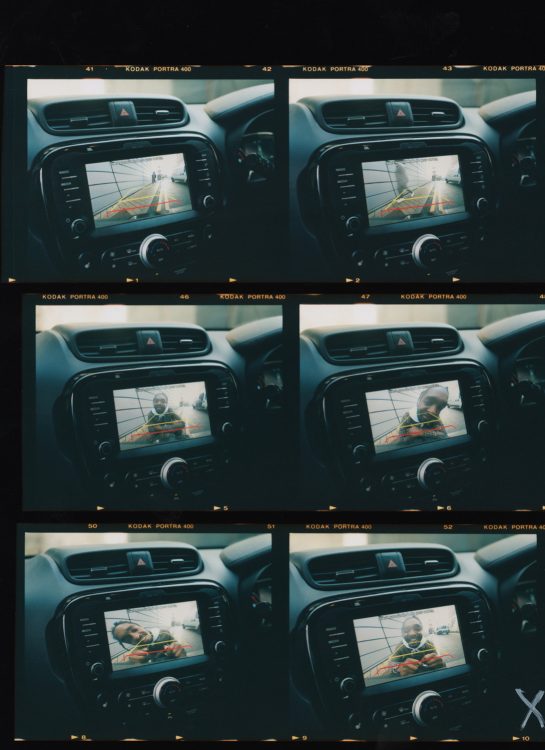- Words Linda Sou
- Photography Elliott Wilcox
- Styling Rhona Ezuma
- Grooming Sogol Razi using MAC Cosmetics
- Photography Assistant Derek Chips
- Fashion Assistant Colleen Finnerty
- Production Studio Notion
G-folk architect and East End Geeza, Hak Baker, chats community, cathartic crying and cracking on in Notion 87!
“Can I interrupt? I know you won’t remember me, but I’m Leon’s aunty—Jackie’s cousin,” says a smiling, older woman, gently tapping singer-songwriter Hak Baker on the shoulder midway through our chat. “Jackie’s cous—yeah, I do remember you!”, he bellows in a boisterous cockney twang, beaming with instant recognition. As the two gleefully embrace and have a quick natter, the strong sense of community and importance that Hak places on his roots are plain as day.
It’s something evident even in his choice of meeting spot at the inconspicuous Limehouse café where we’ve found ourselves today—the faint rattle of creaky coffee machines and the heady aroma of greasy fry ups lingering in the air. “Being local though, innit!” he grins as he sits back down, waving goodbye to Leon’s aunty. “It’s great. I’m happy now… I do remember her. Lovely.” Hak thrives when he’s surrounded by his friends and family and, clearly, the love goes both ways.
An East Londoner through and through, Hak was born and bred in the Isle of Dogs; a region that has undergone a mass transformation from a working-class dockers’ town to a bustling, financial hub. Back in Hak’s day, though, it was a tight-knit community filled with people from every corner of the globe. “On my street, it was me, Irish people, black people, a mix of everyone,” he recalls. “It was great really. I was always laughing. I remember always laughing.”
To discover the music of Hak Baker is to uncover the stories that line the streets of where he grew up. An artist who truly lives and breathes his environment, his music is reminiscent of the great musical storytellers. Lying at the intersection of folk (or ‘G-folk’—grime plus folk—according to the man himself) and spoken word, he tells the tales of his life and his friends’ through nimble melodies and a dextrous lyricism. Armed with stripped-back anthems and odes, informed by raw sprechgesang vocals and agile guitar arrangements, Hak invites us into his world—one filled with melancholy, warmth and an irresistible relatability that draws us in.


A natural-born misfit with a taste for delinquency, he ran riot at school with his mates who were “nicking fucking tractors and cars and setting them on fire and police chases,” Hak tells me, laughing. “Everyone just fucking gelled, like our crew was massive and it just had every race in it and it was like fucking formidable.”
At home, though, he was constantly surrounded by music. In fact, his most formative musical memory is being in the kitchen with his mum on a Saturday when she was cooking up a storm. He recalls: “the tunes are playing, Saturday TV’s on, the reggae’s playing. Saturday or Sunday. Saturday would be soup; Sunday would be chicken. And my mum would have the rare grooves reggae playing, Bob Marley playing, and I would always remember she’d play it loud you know—not quietly. And I just remember loving it.”
All the same, Hak’s journey to the music he creates now has been unconventional to say the least. Initially a core member of the prolific grime crew, Bomb Squad, he eventually transitioned to folk music when he, by chance, discovered his love for the guitar. “I just felt like the guitar kept proposing itself to me like ‘come on then, gimmie a play, come on then!’” he jokes—not that the two seemingly disparate genres of grime and folk don’t overlap. In fact, Hak is adamant in his emphasis on the storytelling that lies at the heart of the two art forms.
What does irritate him, though, is the novelty that he’s received for being a black folk singer, as opposed to making music that’s confined to the genres of, say, rap and R&B.
“It’s ridiculous. It’s weird,” he says, shaking his head. “Going back to the blues—the greatest music of all time—it was all instrument based with people having accents of where they were brought up—Mississippi, Atlanta, you know. Deep country accents, but that’s where slavery was rife and that’s where the music was coming from and that’s where the pain was coming from. So, for people to say that I’m playing a guitar—what people of my colour, origin, have been doing forever—sounding whatever I sound like, because we’ve been transported for the past 400 years. What the fuck’s wrong? It’s fucking ridiculous!”

“I’m a big, emotional, Cancerian wreck, so I need something to hide behind,” he continues. “That’s why I like my dreads over my face most of the time because I can put out something and not too much of myself, because some of them songs just bare everything. So, at least I get to hide behind my guitar, you know. It helps.” This tender vulnerability and frank sensibility is what hits the hardest when listening to Hak’s music—the intimacy that he can produce through poetic documentation and humorous anecdotes is disarming.
“I cry all the time, man,” he admits. “Everyone just cries. I’ve had like the most biggest tattooed up geezers at the front of the stage just crying their eyes out, you know what I mean? It’s great!” But, such is the power that lies at the heart of sharp storytelling that touches upon the injustices, hustle and heartbreak that characterise the lives of everyday people. There’s no façade when it comes to his music, “It’s like regurgitating all them feelings back up eurghhhh,” he says, mock-retching. “Horrible. But, they’re lovely at the same time.”


Chatting to Hak is like chatting to a wise, old creature. He’s clearly a man with a lengthy, storied history of equal parts joy, sadness, laughter and pain. However, as our conversation goes on, he is resolute in his insistence on refocusing the lens and looking towards the future. “Everyone talks about the story like, you know, going to jail and, you know, picking up a guitar in jail—that’s cool and that, but, I’m over that” he tells me frankly. “Now is a new period and this new period is full of prosperity and it’s fun!”.
It’s just a case of “seeing what the world gives you,” he explains. “I feel like the progression I’ve had as a person—of who I am and my understanding and my temperament—I’m not always just like grrrrr grr grrrrrrr. It’s changing and it’s great. The patience which I’ve had to learn and the people that I’ve had to master—it’s a great lesson. A great life. Life lessons in abundance.”
It’s clear he’s taking things at his own pace, with authenticity and the lived experience forming the very core of his creative output. But, I ask, is being such an independent thinker within an industry that can have such strict guidelines not a challenge? He responds saying he’s not compromising one bit: “If you don’t like it and it takes me a little longer, if I have to sleep on the sofa a bit longer, then so be it. I’ve been sleeping on it for years now. My backs already done in,” he chuckles.
That’s something particularly remarkable about Hak Baker, besides his openness and the warmth that radiates from his readiness to wear his heart on his sleeve: his wicked sense of humour and infectious optimism in the face of an, at times, harsh reality.

